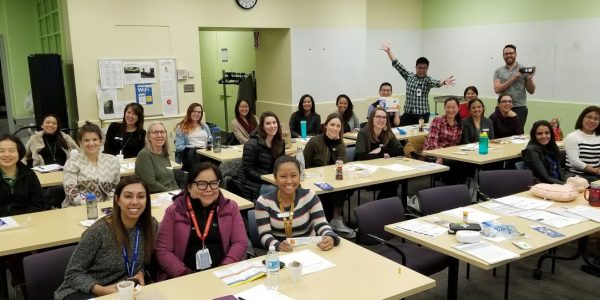Embracing trauma-informed practice in acute care
In the midst of the ongoing opioid crisis, it is becoming increasingly important for acute care staff to understand substance use and challenge stigma while interacting with patients. Using trauma-informed practice (TIP) can help staff mitigate unsafe events and provide better patient care. However, important information on this topic is limited.
To provide staff with more information on TIP, in 2017, the VGH Acute Medicine team launched an education program highlighting the principles of caring for patients with substance use in acute care. Over 100 staff have already attended and provided positive feedback on this new program.
“This education day impacted the way I care for patients by reminding me of the struggles and trauma that so many of them face,” nurse Jessica Machado, reflects. “It’s the type of care every nurse wants to give to their patients.”
What is TIP?
TIP is a strengths-based framework grounded in an understanding of and responsiveness to the impact of trauma, that emphasizes physical, psychological, and emotional safety for both providers and survivors, and that creates opportunities for survivors to rebuild a sense of control and empowerment (Hopper, Bassuk & Olivet, 2010).
According to Elyse Magee, PHC urban health nurse educator, “A key assumption that must be challenged is that substance use is simply a matter of individual choice. Understanding substance use as a choice draws attention away from the underlying causes and influencing factors, and increases the likelihood of blaming and stigmatizing people who use substances.”
Introducing the TIP lens in patient care
To help staff add TIP to their tool kits, the VGH Acute Medicine education program provided information on the following topics:
- Addiction and best practices on opioid replacement therapy by Adrienne Horsefield, VCH Substance Use Treatment and Response Team (START)
- Take Home Naloxone (THN) kit training and certification under the provincial harm reduction program called “Toward the Heart” by Sebastien Payan, VCH nurse educator
- Evidence-based information on alcohol withdrawal and treatments by Dr. JJ Sidhu and Dr. Pouya Azar, VCH Complex Pain and Addiction Services (CPAS) team
- Case-based violence prevention and de-escalation techniques by Conor Macphee, VCH Violence Prevention
- Valuable resources around security supports and interventions by Maninder Shergill and VGH security team
Another key component of the training included Adverse Childhood Experiences (ACEs) and their impact on serious problems with substance use.
Through this education, the Medicine team aims to continue developing programs that uphold overarching principles of person-centred care, and create a compassionate, trauma-informed environment in acute care. More sessions will be available in the coming year. Keep an eye out for further announcements.

